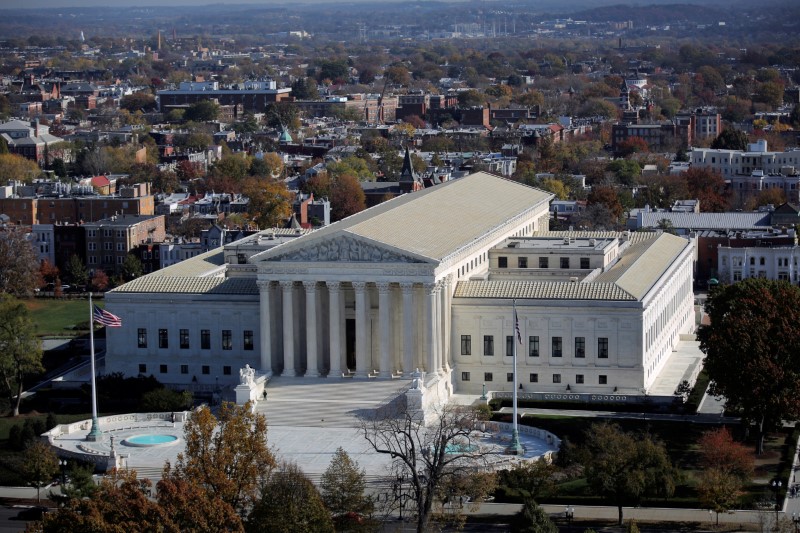By Lawrence Hurley
WASHINGTON (Reuters) - The U.S. Supreme Court on Monday ruled that Republicans in North Carolina unlawfully took race into consideration when drawing congressional district boundaries, concentrating black voters in an improper bid to diminish their statewide political clout.
The justices upheld a lower court's February 2016 ruling that threw out two majority-black U.S. House of Representatives districts because Republican lawmakers improperly used race as a factor when redrawing the legislative map after the 2010 census.
The decision came in one of a number of lawsuits accusing Republicans of taking steps at the state level to disenfranchise black and other minority voters who tend to back Democratic candidates.
The justices found that the manner in which the North Carolina voting district boundaries were sketched violated the U.S. Constitution's guarantee of equal protection under the law. The ruling may offer a roadmap for challenging similarly drawn districts nationwide.
The justices unanimously upheld the lower court on one of the districts and split 5-3 on the other, with three conservatives dissenting.
"The North Carolina Republican legislature tried to rig congressional elections by drawing unconstitutional districts that discriminated against African-Americans and that's wrong," said North Carolina Governor Roy Cooper, a Democrat took office in January.
Critics accused Republicans of cramming black voters into what the NAACP civil rights group called "apartheid voting districts" to diminish their voting power and make surrounding districts more white and more likely to support Republicans. Both districts are held by the Democrats. Of North Carolina's 13 representatives in the U.S. House, 10 are Republican.
"I don't know how any legislature can perform this task when the rules change constantly from case to case, often after the fact," Robin Hayes, chairman of the state Republican Party, said of redistricting.
Democrats have accused Republicans of taking a number of actions at the state level, also including laws imposing new requirements on voters such as presenting certain types of government-issued identification, in a bid to suppress the vote of minorities, the poor and others who generally favor Democratic candidates.
Republicans have said the laws are needed to prevent voter fraud.
Race can be considered in redrawing boundaries of voting districts only in certain instances, such as when states are seeking to comply with the federal Voting Rights Act. That law protects minority voters and was enacted to address a history of racial discrimination in voting, especially in Southern states.
'RACIAL GERRYMANDERING'
Eric Holder, who was U.S. attorney general under President Barack Obama and now heads the National Democratic Redistricting Committee, a group backing Democrats in redistricting fights, welcomed the decision.
"Today's ruling sends a stark message to legislatures and governors around the country: Racial gerrymandering is illegal and will be struck down in a court of law," Holder said, referring to altering political boundaries to give a party an unfair advantage.
The ruling was a rebuke to North Carolina Republicans but the districts in question have already been re-drawn. The new districts already have been challenged in court.
The Supreme Court has never said legislative districts cannot be mapped based on plainly partisan aims like maximizing one party's election chances.
North Carolina Republicans said one of the two districts, called the 12th congressional district, was drawn on purely partisan grounds to benefit Republicans at the expense of Democrats, and the other was drawn to comply with the demands of the Voting Rights Act.
The split among the justices was over the 12th district. Conservative Justice Samuel Alito wrote in dissent that the court should have followed an earlier precedent in which a previous version of the same district was challenged.
"A precedent of this court should not be treated like a disposable household item -- say a paper plate or a napkin -- to be used once and then tossed in the trash," Alito wrote.
Writing for the court's majority, liberal Justice Elena Kagan countered that evidence at trial "adequately supports the conclusion that race, not politics, accounted for the district's reconfiguration." Conservative Clarence Thomas, the court's only black justice, joined Kagan's ruling.
Justice Neil Gorsuch, who had not yet joined the court when it heard arguments in the case in December, did not participate.
The justices last week rebuffed a Republican bid to revive a strict North Carolina voter-identification law that a lower court found deliberately discriminated against black voters.
The Supreme Court in 2013 struck down a key part of the Voting Rights Act in a ruling driven by its conservative justices. Since then it has faulted some Republican redistricting efforts for racial reasons. In 2015, the Supreme Court ruled that Alabama's Republican-backed legislature improperly crammed black voters into certain districts.
The justices on March 1 ordered a lower court to reassess whether Virginia's Republican-led legislature unlawfully tried to dilute the power of black voters. The justices threw out the lower court's decision upholding 12 state legislature districts.
